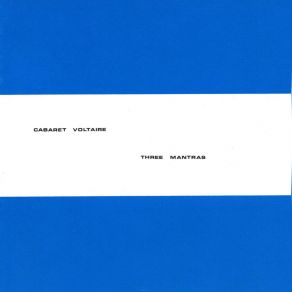Three Mantras
Download links and information about Three Mantras by Cabaret Voltaire. This album was released in 1980 and it belongs to Electronica, Industrial, Rock, Alternative, Classical genres. It contains 2 tracks with total duration of 40:50 minutes.

|
|
|---|---|
| Artist: | Cabaret Voltaire |
| Release date: | 1980 |
| Genre: | Electronica, Industrial, Rock, Alternative, Classical |
| Tracks: | 2 |
| Duration: | 40:50 |
| Buy it NOW at: | |
| Buy on iTunes $2.99 | |
| Buy on Songswave €1.15 | |
| Buy on Songswave €1.15 | |
Tracks
[Edit]| No. | Title | Length |
|---|---|---|
| 1. | Western Mantra | 20:39 |
| 2. | Easten Mantra | 20:11 |
Details
[Edit]It would actually be more accurate to call this album 'Two Mantras,' given that it consists of two sidelong pieces, "Eastern Mantra" and "Western Mantra," which gives the still-then-a-trio a chance to expand its avant-electronic-grunge into trancier realms. Mallinder's abstract ranting is in full effect from the start of "Eastern," talking about bodies in the streets and the like, and from there things move into a rough realm of strange art, Voltaire-style. The combination of Kirk's guitar and Mallinder's bass work here is practically that of Krautrock/motorik, Mallinder playing a steady, quietly varying series of notes while Kirk throws in a variety of crumbling squalls. His work is sometimes vaguely Arabic in flavor, which combined with the length of the song, the hollow drum machine punch driving everything along, and Watson's piercing keyboards is not merely interesting but helps to demonstrate, in a subtle way, some of the future influences on artists like Muslimgauze. The alien feeling at the core of Cabaret Voltaire remains, though, strong and strange as always. "Western Mantra" has the basic trio, plus guests on percussion and found-sound tapes, doing something far more outre. A heavily-treated vocal loop underlaid by a subtle keyboard drone starts the song, interspersed with samples of Arabic and Israeli pop music and various bell sounds — the roots for Muslimgauze in particular really show here! Kirk's crisp playing floats in some time later, stepping in and out of the mix but never predominating, while Mallinder's bass is barely detectable. The occasional bursts of low, clattering pounding, with cymbals if not with drums in the background, combined with the continuing series of song samples, Arabic wind instruments and snippets recorded in a Jerusalem market, heightens the enveloping, striking feel of the piece and release as a whole.